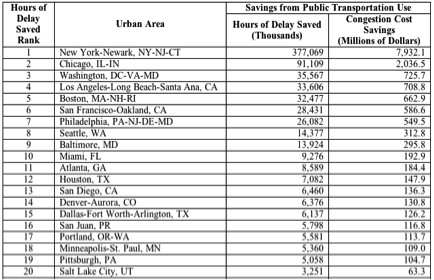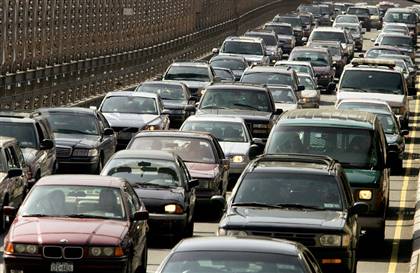Last year, the D.C. region ran away with the dubious honor of Most Congested Metro Area. D.C. area drivers wasted 74 hours and 37 gallons of fuel sitting in traffic last year, which would have cost about $100 over the course of the year. But the gasoline cost is just the tip of the iceberg.
According to the 2011 Urban Mobility Report, released today by the Texas Transportation Institute, this delay cost the average D.C. driver $1,495 once you factor in lost productivity and increased trucking times. In Chicago, it’s $1,568. L.A., $1,334.
Every year, TTI puts out their Urban Mobility Report, and every year we criticize it for its autocentrism. After all, its sole measure is how fast a vehicle can speed down a given mile of roadway. Maybe your city is dense and friendly to pedestrians and bikes, so that it’s easy to glide past the automobile gridlock on your short commute to work. Or maybe transit provides an excellent and affordable alternative to traffic jams. None of that matters to TTI. If someone, somewhere, is sitting in traffic, that’s all that matters. All other measures and modes of urban mobility are ignored.
TTI doesn't bother to figure out how much time is saved if one avoids that congestion by taking transit, but they do examine how much time transit riders save drivers by taking vehicles off the road.

If there were no transit, the country’s drivers would be facing an additional 796 million hours of traffic delay. (Take that, drivers who grumble when their gas tax “user fee” funds mass transit!)
“Operational treatments” like ramp metering, traffic light timing, and removing crashed vehicles from the road have become much more effective in the last 20 years but still don’t come close to the savings provided by transit, saving about 40 percent as much as transit in terms of hours of delays, fuel, and costs.
Still, in TTI’s examination of congestion relief strategies, public transportation is barely alluded to and never mentioned outright, while operational treatments get significant attention. There is a shout-out to smart growth, or “denser developments with a mix of jobs, shops and homes, so that more people can walk, bike or take transit to more, and closer, destinations.” They also suggest telework and, of course, adding capacity.
TTI warns that congestion is only as bad as it is because the economy is still sluggish. We can expect a rapid worsening of the situation when the economy rebounds – 3 more hours of delay by 2015 and 7 hours by 2020, per commuter, with costs rising from $101 billion to $133 billion, more than $900 for every commuter, and enough wasted fuel to fill more than 275,000 gasoline tanker trucks.
I guess it’s time to really get to work on expanding and improving transit service then; right, TTI?






